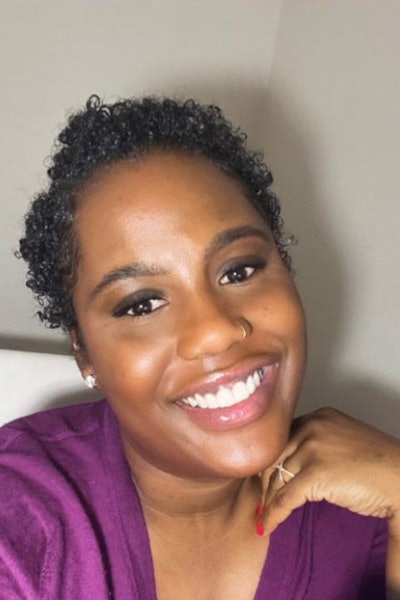Dr. Kayon Hall wants to change the way academia thinks about undocumented students.
“Black and undocumented students are socially and politically left out of the conversation,” said Hall, an assistant professor of higher education administration at Kent State University in Ohio.
This year, Hall published an article with the Journal of First-Generation Student Success about the lived experiences of Black undocumented students, highlighting the ways higher education has excluded them from immigration discourse and support.
 Dr. Kayon Hall, assistant professor of higher education administration at Kent State University in Ohio.
Dr. Kayon Hall, assistant professor of higher education administration at Kent State University in Ohio.
Hall said it’s time for postsecondary institutions to start thinking about who their undocumented resource centers are supporting and targeting, and more institutions need to engage with activist groups and organizers that are leading the way in immigrant representation. Institutions, said Hall, need to ask themselves if their policies and practices are further silencing an already silenced population.
“[Black undocumented students] are invisibilized. They don’t feel like they belong,” said Hall. “If I walk into an undocumented resource center and I don’t see an image like me, I won’t feel like I belong. We use languages that are not inclusive. In doing justice work, we have to constantly ask ourselves, who are we leaving out?”
Numerically, Black undocumented students are in the minority, said Hall. Of the approximately 427,000 undocumented students attending a postsecondary institution, only 12.5% identify as Black, according to a 2021 report from the bipartisan research organization New American Economy and the Presidents’ Alliance on Higher Education and Immigration, a group of U.S. college and university leaders connecting the dots between immigration policy and its impact on students.
Black undocumented students are also less likely to be eligible for Deferred Action for Childhood Arrivals (DACA). Immigrants Rising, a project that connects undocumented individuals to opportunities in higher education, found that only 1% of DACA recipients from the top emigrating countries identify as Black, and only 2% of immigrants from the Caribbean, and 3% of immigrants from Africa, are DACA-eligible. Black immigrants are also twice as likely as other racial groups to be deported.
“It’s easier for folks to think that, because Black undocumented students are not as visible as other groups, they’re safe—they’re not,” said Hall. “We live in an anti-Black world. There’s no safety from that whatsoever, and it’s important for us to protect our students.”
Isolation, fear, and stress confronts Black undocumented students every day, said Hall. Students told Hall they felt invisible in conversations about immigration while grappling with the complex reality of being Black in America. One Black undocumented student, who shared his story with Hall for her research, spent the first five years of his life in another country before coming to America and experiencing its racial politics.
“He talked about how this racial categorization of Blackness bothered him—to be called Black, reduced to a color, is an insult. But what I was also hearing him say was, ‘To say I’m Black is to say, I’m American in a country that doesn’t want me,’” said Hall. “Undocumented Black students navigate an anti-immigrant, anti-Black world. There are real repercussions of being Black in this space.”
These complex experiences can become even more tangled when Black undocumented students look to attend higher education after graduating high school. While federal policy prevents purposeful exclusion of any learner from K-12 education, regardless of their immigration status, no such law controls postsecondary institutions. Undocumented students must navigate ever-changing state policies while searching for scholarships that include them, scrolling through university and collegiate websites for campus environments that acknowledge their unique experience.
Dr. Leslie Gonzales, an associate professor in the higher, adult, and lifelong learning unit at Michigan State University, has been a mentor to Hall. Gonzales said Hall's work has been critical to helping people understand how a person's undocumented status is connected to the country's larger racial history and context.
"Dr. Hall was so committed to framing her work and continues to do so, through a coalitional lens," said Gonzales. "She was always conscientious to point out that the struggles of multiple communities, especially communities of color, are overlapping and intertwined. She often built from research that may have focused on non-Black communities of color (Asian American, Latinx), but always searched for the through-line."
Hall said faculty, staff and leadership all have an important role to play in making sure their Black undocumented students are seen, heard, and supported.
“We have to figure out a way to educate university folks to be more inclusive,” said Hall, citing training tools like undocumented ally training. Faculty can also bring the work and stories of undocumented immigrants into their curriculum.
“When I teach, I ask myself—do I put an article written about a group of people, or an article written by groups of people about themselves,” said Hall. “We need to get better at thinking of other experiences, shifting the narrative to be more inclusive for Black, Asian American Pacific Islander, and other undocumented folks that are not Latinx. There’s space for both of those things at the same time.”
Liann Herder can be reached at [email protected].






















